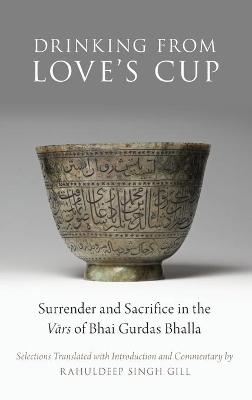AAR Religion in Translation
1 total work
Drinking From Love's Cup
Published 26 January 2017
Bhai Gurdas Bhalla (d. 1636 CE) is widely considered the most important non-canonical poet in Sikh history, having shaped the theology and ethics of the tradition for centuries. His beautiful poems, which offer an authoritative illustration of Sikh life in the early seventeenth century, defined Sikh identity during a tumultuous period of upheaval. In Drinking from Love's Cup Rahuldeep Gill brings together for the first time a collection of the revered poet's
early work, masterfully translated into English, along with the original Punjabi text.
The magic of Gurdas's poetry, says Gill, lies in its fusion of Islamicate narrative traditions with the heroic literature of India to speak about death, martyrdom, and the spirit's absolution in love. Rhythmic, elegant, and lucid, the poems weave Sikh scripture into the lyrical fabric of Sikh spirituality. Challenging traditional scholarship surrounding the dates of Gurdas's writing, Gill suggests that Gurdas wrote his poetry to console the Sikh community, which was in mourning over the
execution of the fifth of the Sikh founders, Guru Arjan (d. 1606), by agents of the Mughal Empire. Ranking among the best of the Punjabi language troubadours, Gurdas in his verses immortalized the fifth Guru's role as a martyr. His poems were written to encourage the faithful to stay involved in the
community, resist hegemony, and reinforce Sikh beliefs during sectarian upheaval.
This book brings a contemporary flair to Gurdas's moving stanzas, and also unearths fresh insights about his life and context.
early work, masterfully translated into English, along with the original Punjabi text.
The magic of Gurdas's poetry, says Gill, lies in its fusion of Islamicate narrative traditions with the heroic literature of India to speak about death, martyrdom, and the spirit's absolution in love. Rhythmic, elegant, and lucid, the poems weave Sikh scripture into the lyrical fabric of Sikh spirituality. Challenging traditional scholarship surrounding the dates of Gurdas's writing, Gill suggests that Gurdas wrote his poetry to console the Sikh community, which was in mourning over the
execution of the fifth of the Sikh founders, Guru Arjan (d. 1606), by agents of the Mughal Empire. Ranking among the best of the Punjabi language troubadours, Gurdas in his verses immortalized the fifth Guru's role as a martyr. His poems were written to encourage the faithful to stay involved in the
community, resist hegemony, and reinforce Sikh beliefs during sectarian upheaval.
This book brings a contemporary flair to Gurdas's moving stanzas, and also unearths fresh insights about his life and context.
